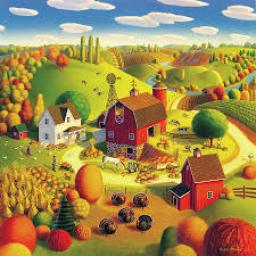Summer
I had been looking forward to the summer all year. We would go to stay with my grandparents. They lived on a farm in Illinois. They had all kinds of things to do. We would get up early and milk the cows. Then we would feed the chickens. It was so different from living in the city. “It is like making a trip between civilizations. Consider how different it is to live in different ways --the city and the farm, the rural and the urban,” my brother said. He was going to college and liked to use big words like that.
The day came to go there. I was excited. So was my brother. My mother packed a lunch for us to eat along the way. Then we left. After about 3 hours we were halfway there.
But then it started to rain. “The road is dangerous,” my mother said. “We could skid.” It was hard to see where we were on the road because the rain was so heavy. “This is much more than a little rain,” my brother said. “The forecast was for just light rain.”
My mother took an exit ramp. We left the highway and stopped at a restaurant. “Better safe than sorry,” she said. “I will call and tell them to anticipate a late arrival.”
We were waiting there for about an hour when my brother said, “Let’s eat lunch.” We all thought that was a great idea, so we did.
“Imagine long ago when pioneers lived here,” my brother said. It would have taken them weeks to travel as far as we have in three hours. Just think about what life was like then. They would have been so tired. They would have been hot and hungry. We have gone about 120 miles. And we are comfortable. We have air conditioning and restaurants.”
“There have been so many changes that make a difference to how people travel,” my brother said. “Imagine a world without cell phones, air conditioning, and fast cars.”
“But that is what we have when we are at the farm,” Mother replied. “That is how your grandparents live. They don’t have any cell phones, and they just have that slow old truck.”
Just then the rain stopped. We finished our lunch and then were back on the road. Then we drove a long while to get us to the farm.
When we arrived, everyone was glad to be at the end of this trip and at the beginning of a great summer. “Now we will have a great summer,” my mother said. I agreed. This would be another good time.
